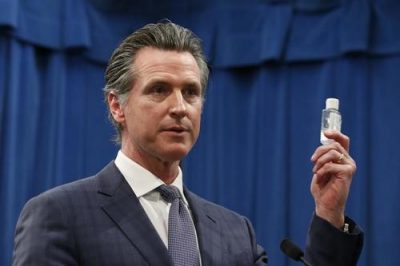California Refuses to Disclose COVID-19 Data Used to Drive Lockdowns

California Governor Gavin Newsom (D) promised months ago that the state’s COVID-19 policy decisions would be driven by transparent data that would be shared with the public.
Now, his administration is refusing to disclose key information used to determine when lockdown orders are implemented or rescinded – and has denied a public records request filed with the California Health and Human Services (CHHS) Agency on May 28 by the Center for American Liberty (CAL) seeking both the data and science behind the state’s lockdown decisions, according to Fox News.
State health officials now say they rely on a ‘very complex set of measurements that would confuse and potentially mislead the public,’ AP reports.
In short, California says you’re too stupid to understand their rationale for mandating thousands of businesses into financial ruin through what appear to be arbitrary and unscientific decisions. To wit, at least two California judges have struck down the state’s draconian mandates over lack of scientific evidence to support lockdowns and restaurant restrictions.
Not only that, according to SFGATE, there’s growing speculation that California’s ban on outdoor dining may have contributed to the state’s COVID-19 surge. Not the best of optics as as a GOP effort to recall Newsom continues to gain momentum.
According to CAL executive director Mark Trammel, the Golden State won’t answer why, for example, they won’t answer why indoor religious services are strictly forbidden while other venues where people gather are just fine.
“If it’s safe enough to go to a marijuana dispensary or Macy’s or Costco that same standard should apply to parishioners in our congregation they should be able to sep in pews and wear a mask,” Trammel told Fox News in a recent interview.
Dr. Lee Riley, chairman of UC Berkeley’s School of Public Health infectious disease division thinks the state’s lack of transparency is troubling.
“There is more uncertainty created by NOT releasing the data that only the state has access to,” he told the Associated Press in an email.
More via AP:
Newsom, a Democrat, imposed the nation’s first statewide shutdown in March. His administration developed reopening plans that included benchmarks for virus data such as per capita infection rates that counties needed to meet to relax restrictions.
It released data models state officials use to project whether infections, hospitalizations and deaths are likely to rise or fall.
As cases surged after Thanksgiving, Newsom tore up his playbook. Rather than a county-by-county approach, he created five regions and established a single measurement — ICU capacity — as the determination for whether a region was placed under a stay-at-home order.
In short order, four regions — about 98% of the state’s population — were under the restrictions after their capacity fell below the 15% threshold. A map updated daily tracks each region’s capacity.
At the start of last week, no regions appeared likely to have the stay-at-home order lifted soon because their capacity was well below 15%. But within a day, the state announced it was lifting the order for the 13-county Greater Sacramento area.
Suddenly, outdoor dining and worship services were OK again, hair and nail salons and other businesses could reopen, and retailers were allowed more shoppers inside.
Local officials and businesses were caught off guard. State officials did not describe their reasoning other than to say it was based on a projection for ICU capacity.
State health officials relied on a complex formula to project that while the Sacramento region’s intensive care capacity was below 10%, it would climb above 15% within four weeks. On Friday, it was 9%, roughly the same as when the order was lifted.
“What happened to the 15%? What was that all about?” asked Dr. George Rutherford, an epidemiologist and infectious-diseases control expert at University of California, San Francisco. “I was surprised. I assume they know something I don’t know.”
Trying to explain the quagmire, CA Health and Human Services Agency spokeswoman Kate Folmar said (with a straight face?) that officials are committed to transparency – and that projected ICU capacity is based on several variables – including available beds and staffing that can change regularly.
“These fluid, on-the-ground conditions cannot be boiled down to a single data point — and to do so would mislead and create greater uncertainty for Californians,” she said.
According to First Amendment Coalition Executive Director David Snyder, the state’s lack of disclosure is disturbing.
“The state is wielding extraordinary power these days — power to close businesses, to directly impact people’s livelihoods and even lives — and so it owes it to Californians to disclose how and why it makes those decisions,” he said, adding that secrecy “is exactly the wrong approach here and will only breed further mistrust, confusion and contempt for the crucial role of government in bringing us out of this crisis.”
*
Note to readers: please click the share buttons above or below. Forward this article to your email lists. Crosspost on your blog site, internet forums. etc.
Featured image is from Zero Hedge

